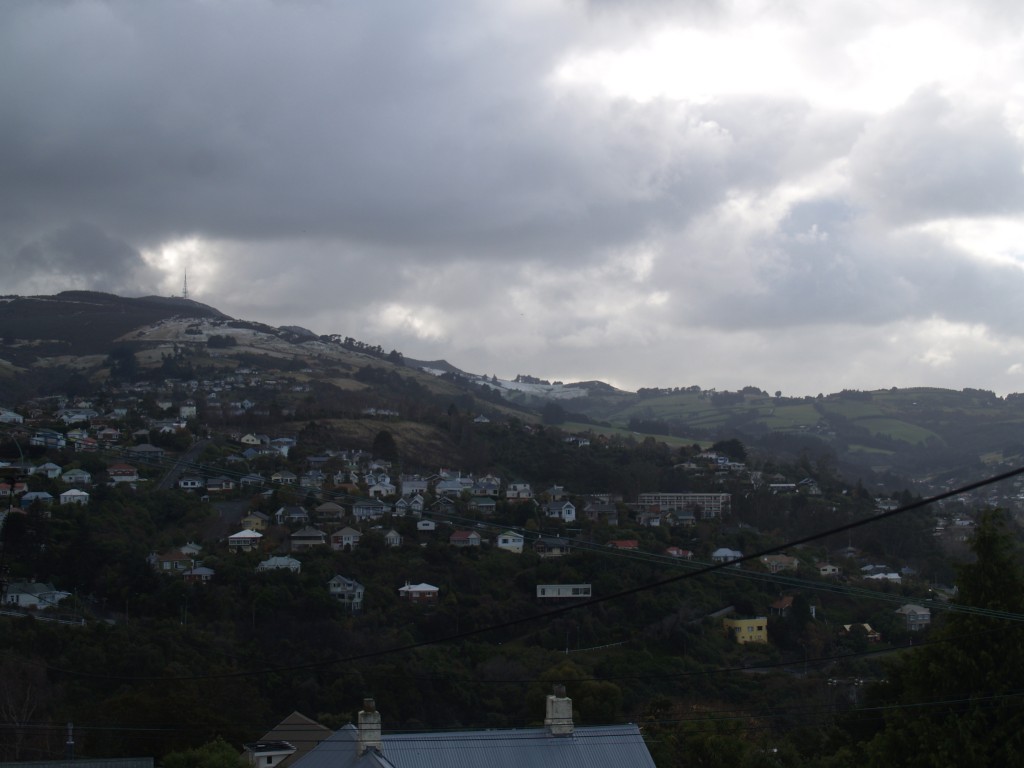Pentecost sunday.
May 31, 2009 in Daybook, Theology by pukeko

It is both Queens’s birthday weekend and Pentecost Sunday. In my view, winter runs in the South from Queen’s birthday until the beginning of Term IV (which is in September), and it at times does not feel warm until after Labour Day (October 25). There is an icy blast coming through and spectacular clouds.
The first pentecost lead to people thinking this cult was full of people who were drunk. Christians are often called foolish, or worse. From the Pentecost reading:
Acts 2:1-21
1When the day of Pentecost had come, they were all together in one place. 2And suddenly from heaven there came a sound like the rush of a violent wind, and it filled the entire house where they were sitting. 3Divided tongues, as of fire, appeared among them, and a tongue rested on each of them. 4All of them were filled with the Holy Spirit and began to speak in other languages, as the Spirit gave them ability.
5Now there were devout Jews from every nation under heaven living in Jerusalem. 6And at this sound the crowd gathered and was bewildered, because each one heard them speaking in the native language of each. 7Amazed and astonished, they asked, “Are not all these who are speaking Galileans? 8And how is it that we hear, each of us, in our own native language? 9Parthians, Medes, Elamites, and residents of Mesopotamia, Judea and Cappadocia, Pontus and Asia, 10Phrygia and Pamphylia, Egypt and the parts of Libya belonging to Cyrene, and visitors from Rome, both Jews and proselytes, 11Cretans and Arabs-in our own languages we hear them speaking about God’s deeds of power.” 12All were amazed and perplexed, saying to one another, “What does this mean?” 13But others sneered and said, “They are filled with new wine.”
One of the Anglican Online comments around this date is worth printing in full.
Hallo again to all on this day of Pentecost.
It’s just possible that this is the most dangerous sentence Christians can utter: Come, Holy Spirit.
Do we really know what we’re praying for when we intentionally utter, in whatever language, that plea? We wonder. It’s so easy to domesticate Our Lord the Holy Spirit — and we mean no irreverence when we write that. Since that first Pentecost, the Spirit has always ‘been there’ and we presume that It is ever near us, hovering, guiding, chiding, strengthening. And so It is. But yet there are times when we see fit to invoke, quite solemnly and intentionally, the Holy Ghost to come down upon us and guide our councils, conventions, and committees.
Lightning over MartiniqueSo what are we doing when we call out? If the Holy Spirit is always ‘here’, why the need to summon It? Perhaps because the third person of the Trinity isn’t pushy and only comes when invited. The power and the presence are always with us, indeed, but unless we call upon and cooperate with the Spirit, the graces and the gifts may remain as potentialities only. We’re told that the Holy Spirit will lead us into all truth, but we need to initiate that call to be led. And that can be an awesome and aweful invitation, to open ourselves, our churches, our councils, our lives, to the inrush of the Spirit, Which will take us to places we may rather not go. Exhilarating and frightening and uncontrollable.
Just like that first Fiftieth Day. It’s considered an antitype to the story of the Tower of Babel. Our ancestors undertook that tower’s construction and, as well-trained architectural subcontractors, we spoke in one tongue, understood and efficient. But, for all the classic reasons, we failed in our building and descended into a babble of language, from then on to be understood only by those in our immediate neighbourhood. Tribal societies indeed.
Fast forward from that tower to the city of Jerusalem on that great feast of Pentecost. That same ethnic and regional babbling all round, just like a corridor in a busy international airport. Then that mighty wind stirring. And, all of a sudden, that linguistic fragmentation is not merely reversed, but rather that knot of verbs, adjectives, gestures, nouns, dangling participles made all clear. Heard. Understood. Babel Made Better. What an astonishing day. But fear and awe were surely part of the astonishment.
Perhaps we need to do more invoking of the Holy Spirit in these fractious days in our Anglican Communion. The babble of irate bishops, the hissing of blogs, the GAFCONS and Lambeths, the acronyms and the interest groups . . . may the pieces and shards of our divisions be, God willing, regathered and remade through the guidance of Our Lord the Spirit.
Come Holy Spirit. We are aware you are not to be domesticated by us: you are to instead to change us